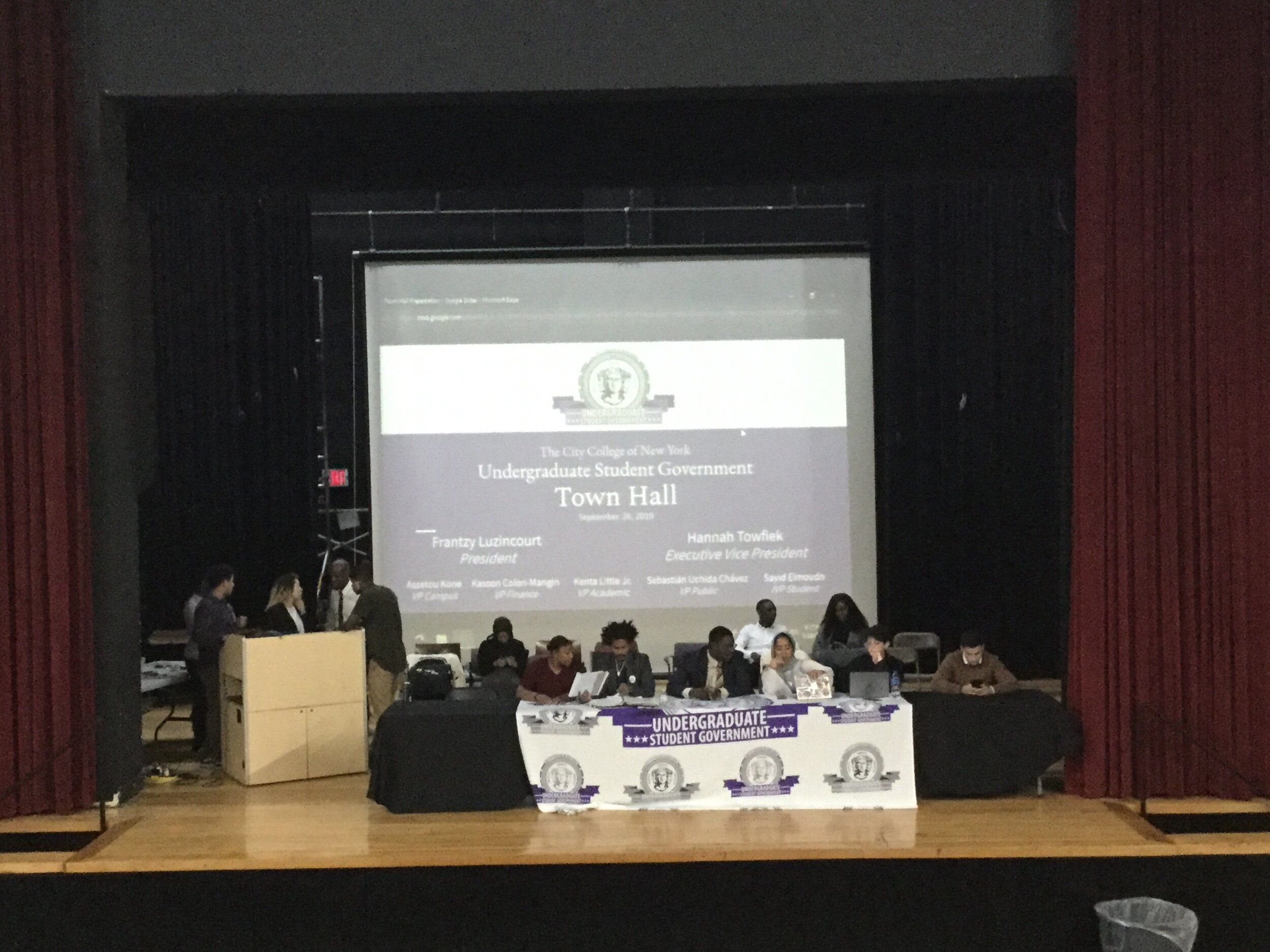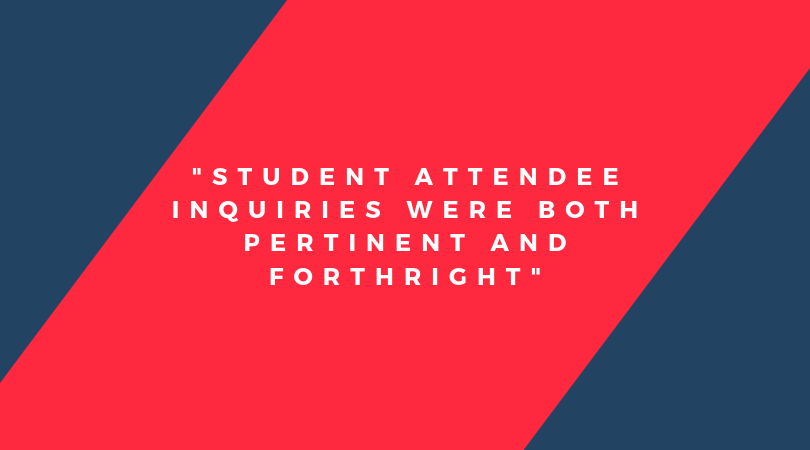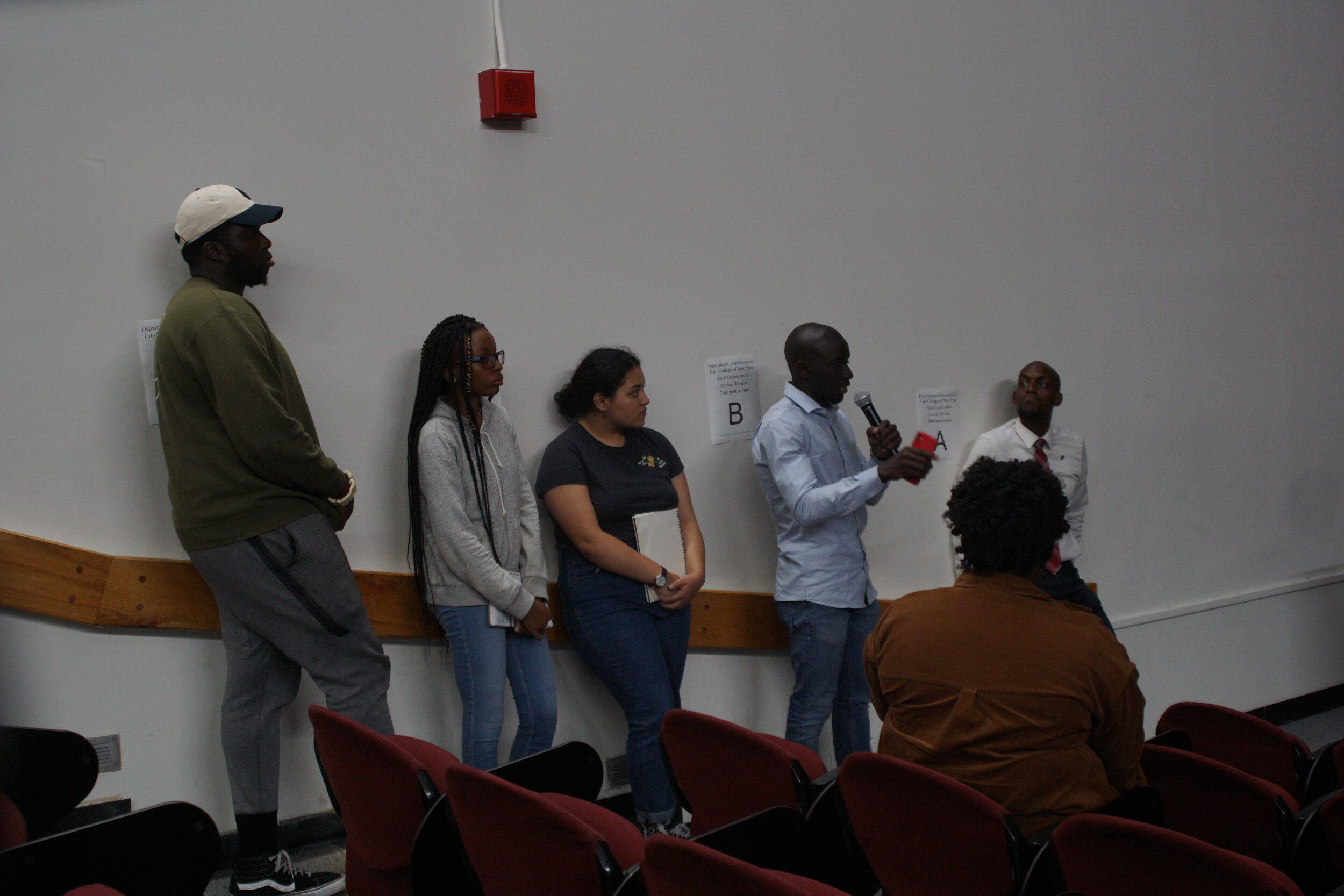USG Town Hall: Initiatives Going Forward
Words by Eric Bilach
Graphics by Aspasia Celia Tsampas
A new semester isupon us at City College. Unfortunately, so are the many longstanding issuesthat continue to hamper students’ daily experiences on campus year in and yearout.
In an attempt toaddress these campus-wide concerns, the Undergraduate Student Government (USG)hosted the first of their periodic town hall meetings this past Thursday,September 26 in the Aronow Theater. Moderated by Jamell Henderson, coordinatorof the CUNY Rising Alliance, the meeting featured a panel of student governmentrepresentatives (including seven executive members and an assortment of classsenators) and attracted approximately 50 attendees.
Hendersonspearheaded the meeting with a statement designed to empower the relativelysilent majority of the undergraduate student body. He encouraged undergrads to“spread the word” about what’s going on at City College—both the “good” and the“bad”—in order to promote general campus awareness to the larger studentpublic.
Henderson argued that the fundamental concept of “change” cannot occur without a proper catalyst. That is to say, institutional reform at City College can only be ignited through students’ active engagement with the USG. It is the duty of the students to voice their needs, opinions, and concerns to the USG, whose function, in turn, is to hold the higher administration responsible for remedying the various issues that crop up around campus. Conversely, student apathy toward campus affairs is what allows problems to persist on a semester-to-semester basis. As it follows, Henderson makes the unsympathetic (albeit fair) claim that if the student body does not make the call for change, change is unlikely to occur.

Plans for the Future
Following Henderson’sopening remarks, the seven executive members were invited to introducethemselves to the audience, as well as explain their role within the USG andthe goals they wish to accomplish throughout their tenure in office.
Frantzy Luzincourt, the president, was first to speak. The crux of his agenda focuses on enabling students with the ability to “let their voices be heard,” and to help them overcome any obstacles that may impede them from doing so. Luzincourt begrudgingly admitted that students often feel disconnected from the USG and its initiatives, so he plans to incorporate them more and more into the “decision-making process” as the semester unfolds.
Second was Assetou Kone, vice president of campus affairs. She spoke readily on the prevalence of “food insecurity” (the lack of access to a sufficient quantity of affordable and nutritious food) around campus, as well as her intention to create awareness of local restaurants offering discounted yet appetizing eating options. Moreover, Kone advocated for greater collaboration between clubs in order to maximize the number of students participating in on-campus events and activities.
Third was KentaLittle Jr., vice president of academic affairs, whose ultimate goal is toimprove undergraduate student representation. He wishes to talk directly withstudents in order to ascertain “what exactly is going on in their classes.”With this sort of knowledge, Little claimed he will be able to grant students alarger say in departmental affairs.
Fourth was KassonColon-Mangin, vice president for finance. His agenda seeks to promote“financial literacy” (the skills that allow individuals to make well-informeddecisions regarding their finances) around campus. Colon-Mangin insisted thatthe use of funds generated from student and club-related spending ought to bemade transparent to the student body by the higher administration. Not onlydoes the VP for finance want this paper trail to be visible, but he is also infavor of having the revenue collected to be allocated in such a way thatdirectly benefits the undergraduate student population.
Hannah Towfiek,executive vice president, was fifth to speak. She reinforced the notion thatbecause the undergraduate student body and higher administration rarely evercome into contact with one another, the USG serve as the liaisons between thesetwo entities. As such, Towfiek’s policies strive for greater admin-studentcommunication, student engagement with the USG, and transparency on the part ofthe higher administration.
Next wasSebastian Uchida, vice president of public affairs, who professed the need foran undergraduate student uprising (a “movement” of sorts, as he put it) inorder to combat the “imperfections” of the CUNY system. Uchida’s goals thisacademic year are predicated on empowering students, which includes keepingthem informed through his proposed student newsletter, bi-monthly studentpodcast, and student advocacy center.
Sayid Elmoudni, interim vice president of student affairs, was last to speak. In his message to the audience, Elmoudni announced he was focused on ensuring that all students feel welcome both on campus and in collaborating with the USG. He also acknowledged that the USG exists to represent the undergraduate student population and advocate on their behalf. In accordance with this, Elmoudni is determined to provide each student with the “best college experience ever.”

Audience Inquiries
As the evening progressed, the meeting segued into a Q&A sessionsimilar to those featured at political town halls. Students in attendance wereinvited to come to the front of the theater to ask any of the seven executivemembers a campus-related question of their own formulation. To break theproverbial ice, Henderson posed the first question to the executives: “What aresome of the challenges the USG face and how do you plan to tackle them?
Answers for Henderson’s question were varied and offered some key insights into each executive’s perspective on the gravity of particular issues around campus. Perhaps the most thought-provoking response came from Colon-Mangin, who referenced the constant setbacks this current USG will have to endure due to the actions of previous student government and administrative groups.
“Consequences have trickled down,” remarked Colon-Magin. He seems tobe making the point that much of the USG’s work revolves around cleaning up themistakes made by the representatives that preceded them. As such, a heavy focusis placed on the failures of the past instead of the potential triumphs of thefuture. Some of the lingering setbacks the USG currently face include thecafeteria vendor contract debacle and budget deficit.
Student attendee inquiries were both pertinent and forthright. Six questions were asked to the executives (most of them directed at Colon-Mangin) and ranged from the campus’ crumbling infrastructure to the allocation of funds.
Perhaps the most discussion-inducing question came from one sophomorestudent, whose time on campus is typically spent at their work-study job in theCohen Library. The student highlighted some of the frequent complaints theyhear from dissatisfied library-goers on the “unsanitary conditions” present inCohen. Among these complaints include bed bug and mice sightings, leftovercrumbs and spills in the study rooms, and the wild raccoon situation from lastsemester which resulted in the temporary closure of the library and itsservices.
The student alsorevealed that the higher administration has not made a conscious effort to helpfix the campus’ crumbling infrastructure, particularly in the library. Instead,the funds appropriated for Cohen’s budget is used predominantly on thetechnology department, online library databases, and workers’ salaries.Regarding the library’s current state, the student asked the USG, “What do youplan to do to fix this?”
The executivesbanded together to provide the student with one all-encompassing answer to herquestion. Luzincourt affirmed that he plans on holding a meeting with hiscabinet to discuss a solution to improve the “disgusting” conditions in Cohen.Colon-Mangin claimed that he would examine how funding is being used in thelibrary and, if possible, how it can be allocated in a “more proper fashion.”Uchida mentioned, with respect to student dignity, that all undergrads have theright to a clean library and study spaces. He aims to use his position as VP ofpublic affairs to raise awareness about this issue.
The otherquestions asked by students (paraphrased in some instances to provide bettercontext) were as follows:
- “What happens if our funds dry up?”(directed at Colon-Mangin)
- “Can we organize financial educationseminars for students?” (directed at Colon-Mangin)
- “Is there a baseline fund that all clubsreceive?” (directed at Colon-Mangin)
- “Can you establish a policy where alltextbooks required by professors are available in the library?” (directed atLittle)
- “Since fraternities and sororities do notreceive the same amount of financial assistance as clubs, how can the USG helpprovide that for them?” (directed at Mangin-Colon)

Closing Remarks
To conclude thefirst USG town hall of the academic year, Henderson reiterated that thestudents are responsible for communicating with the USG in order to address thecommon issues that plague their daily experiences on campus. In lieu ofsilence, he urges all undergrads to abide by his personal mantra of the “SixC’s”—“Commitment Creates Consistency, Consistency Creates Changes”—for thebetterment of the school. Henderson also professed that the “ultimate power isstudent power,” and the tandem formed between the undergrads and USG boasts thecapacity to bring about great change to City College, wherever it is needed.
If you would like to speak with membersof the USG directly, you are encouraged to visit them in the NAC Rotunda duringclub hours or in NAC 1/111.





